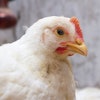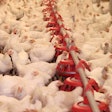
While Taiwan and Bulgaria are the only countries to have officially recorded new outbreaks of avian flu in poultry over the past week, outbreaks of the disease have been reported in India, Ireland, and Poland. Two children have been confirmed with flu infections of avian origin.
Avian influenza in Taiwan
Five outbreaks of highly pathogenic avian influenza (HPAI) have been reported by Taiwan’s animal health agency over the past week. Caused by three different HPAI virus subtypes, these latest outbreaks led to the loss of almost 37,000 poultry through mortality or culling to halt the further spread of infection.
The H5N2 virus variant was detected at two goose farms at the end of last month, according to the Council of Agriculture’s report to the World Organisation for Animal Health (OIE). Affected were a flock of 1,151 meat geese in the Sihu area of Yunlin County and another of 1,342 goose breeders in the Houbi district of Tainan city. Elevated mortality was observed at both of the farms. The remaining birds have been destroyed.
This virus was first reported in Taiwan in early 2015. It has been detected in 24 outbreaks in poultry so far this year, and resulted in the loss of more than 246,000 birds.
A more recent arrival among Taiwanese poultry is the H5N5 virus. This variant has been responsible for 18 outbreaks in poultry since September of 2019. Latest to be confirmed by the Council of Agriculture are two recent outbreaks among flocks of native chickens in Yunlin. Almost 2,500 of the birds died, and more than 28,800 more have been destroyed.
After an absence of more than one year, a third HPAI virus variant — identified only as H5 — returned to Taiwan in October of 2019. In the past week, the Council for Agriculture has reported to the OIE a second outbreak. The virus was detected at a duck farm in Yunlin in mid-December of last year. No symptoms had been reported, and there had been no spike in mortality.
Following confirmation of all HPAI outbreaks in Taiwan, affected flocks are destroyed, and the premises are cleaned and disinfected. Poultry flocks within three kilometers of the outbreak are tested, and subjected to intensive surveillance for the following three months.
Bulgaria confirms sixth outbreak
There has been one new outbreak of HPAI in Bulgaria, according to OIE. After 44 of the more than 31,000 birds at a farm in the Plovdiv region died, the H5N8 virus was detected at a farm in the Plovdiv region earlier this month.
Based on the agriculture ministry’s reports to the OIE, the latest cases bring the country’s total outbreaks since mid-February to six. All have occurred in the central-southern region of Plovdiv. Losses to mortality or culling now exceed 122,700 birds.
Two new outbreaks in Poland
Latest to be reported is an outbreak of HPAI in a laying flock in the area of Wroclaw, according to the Italian health authority and research organization for animal health and food safety (IZSVe). The H5N8 virus was detected in a backyard flock of 74 hens. Poland’s veterinary agency reports that control and eradication measures have been initiated.
Just two days earlier, the same virus was confirmed in a commercial flock of around 10,340 fattening ducks in the province of Lodz.
These latest outbreaks bring to 32 the number of HPAI outbreaks in Polish poultry so far this year, based on information from IZSVe. Losses of poultry already exceed 484,500 birds.
Avian flu confirmed in Ireland
Avian influenza has been confirmed at a farm in County Monaghan in the Republic of Ireland. Three other poultry flocks in the area are being investigated.
Now known to be infected is a commercial egg flock, reports Irish Times. The infection has led to the suspension of egg deliveries from the farm, and to a temporary shortage of eggs at some retailers.
According to the agriculture department, the type of avian flu is not notifiable, and presents no risk to public health or international trade. Officials suspect that a low-pathogenic avian influenza (LPAI) virus of the H6N1 subtype is involved in the outbreak.
Around 450,000 poultry at the infected farm will be culled, reports Anglo Celt.
Indian wild birds test positive for avian flu virus
Avian influenza virus has been detected in wild birds at two locations in the southern state of Kerala, reports The Hindu. It is reported that pet birds are being culled, and that bats are also being tested for the virus.
So far, the virus has not been detected in poultry, but the movement of domestic birds to other areas has been halted. Farmers report officials are pressuring them to cull their birds. The government is paying compensation to owners whose poultry are culled—100 rupees (INR; US$1.34) for young birds, and INR200 for each bird two years or older.
The alarm was raised after a number of wild birds—thought to be egrets—were found dead recently in the Kozhikode district of the state’s capital, Thiruvananthapuram.
In January, a single outbreak of HPAI linked to the H5N1 virus subtype was reported at an agricultural university poultry farm in the eastern state of Odisha.
Two new influenza infections in humans
In its latest update, the World Health Organization (WHO) reports two new cases of avian influenza A (H9N2) infections in people linked to poultry.
First case was a young boy in Hong Kong in early February. He had been admitted to hospital, and his condition was later described as “stable”. The H9N2 virus was subsequently identified. The child had previously stayed in Guangdong province with relatives who kept poultry, although no direct contact with live birds was reported.
In Senegal, West Africa, the same virus subtype was detected in a child attending a health center one year ago. The patient—who likely had contact with backyard poultry—has recovered. According to WHO, this virus is increasingly reported in poultry in Africa.
View our continuing coverage of the global avian influenza situation.

















